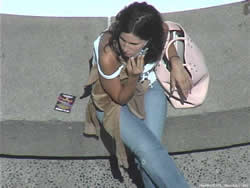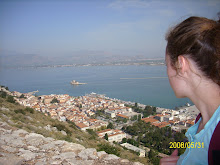
Ken Goldberg's work questions our trust in what we see on the internet. It is what he calls "telepistemology," or the study of the nature of knowledge gained through remote, mediated sources such as the internet. In his work, Telegarden (1995), he gives people a chance to take care of living plants through the internet by operating a robotic arm. From their home computers, people can register as community members to care for the plants. Goldberg wants users to have doubts about whether the plants and the robotic arm are real and he says, "media technology generally facilitates the suspension of disbelief. I'm trying to facilitate the resumption of disbelief."
This project reminds me of the work of landscape artist such as Andy Goldsworthy, who goes out into nature and creates whole pieces of art just from what is available outside. Goldberg has taken nature and put it into a kind of scientific frame where it can be cared for by people electronically whereas Goldsworthy leaves his work where he created it, letting it be destroyed naturally and he only keeps it in the form of photographs.

In Demonstrate (2004), Goldberg uses a telerobotic surveillance camera placed above Sproul Plaza at U.C. Berkeley. On the Demonstrate website, users can control the cameras to focus on or zoom in on people in the plaza and post text about the images. The plaza was the site of anti-war demonstrations and a launching pad for the Free Speech Movement in the '60s and this work was created in honor of the 40th anniversary of the Free Speech Movement. It raises questions about freedom and privacy in public places in a time when technology is regularly used to capture our images without our permission.
Today, we can be captured several times a day on security cameras as we walk by or in buildings. The government, companies or other places use these cameras to protect themselves. In this project, Goldberg has put regular people as opposed to building security, behind the cameras. The people in the plaza are being watched and spyed on by regular people just like them. This makes me wonder how those people would feel if they knew they were being watched. When we walk by a security camera, we don't really think anything of it. We don't have to worry that we are being watched because we are not doing anything wrong and we don't really think about anyone behind the camera. The camera is watching us, not people. However, if we know that other people can see us we will be more self-aware because we are thinking about how they are percieving or judging us.

grace - you're really lacking entries - remember, you need an artist entry for each week, and also responses to each critique (check the syllabus).
ReplyDelete